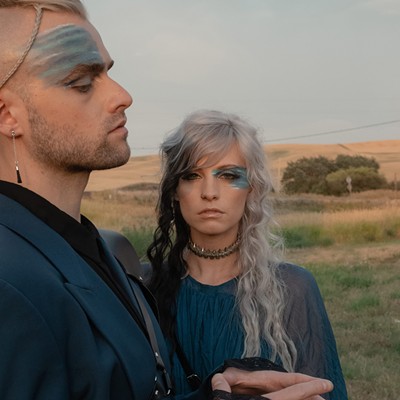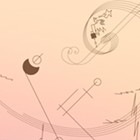Someone’s written “BONERZ!!” on the door of Alex Davis’ office. Inside, the floor is littered with emerald green tapes, silver cassette labels, clear plastic cases, shipping boxes and packing supplies.
Davis, a 19-year-old George McFly look-alike in purple-laced sneakers and blue socks, shares this room — which doubles as his bedroom, his shipping department and his studio — with two other sophomores. Their room is a sizeable basement space at the southernmost end of Warren Hall, the largest coed dormitory at Whitworth University. It’s your standard dorm room: bunked beds, a hot pot, a blender, a mini fridge. The obligatory drinking poster (theirs says, “Finish Your Beer, There Are Sober Kids In India!”). The inescapable locker-room/old shoe/garbage stink — your standard-issue dorm smell.
It’s more than just a dorm room, though: Room 009 is the center of operations for Leftist Nautical Antiques, a record label that Davis runs between classes, while he does homework and when he’s not working as an underwriter for the campus radio station, Whitworth.fm.
It’s a venture that started out of boredom during Davis’s freshman year at Whitworth, a side project that’s transformed into both a full-time job and a venue for releasing limited-edition cassette tapes of the music he loves: punk, pop and drone.
“I’m not trying to promote one genre,” he says. “It’s really fun to do that — to just be above the genres, kind of.”
But it’s also Davis’s way of getting people to hear music the way that the artist intended for it to be heard: not in track-by-track iTunes downloads, but as full, complete albums.
“Part of what I love about tapes and vinyl is you just plop it on until it ends. You’re getting the whole album the way it was meant to be listened to, the way the artist wanted you to hear it,” he says. “I guess I’m kind of into forcing people to listen.”
It’s something that Tony Brown, owner of Unified Groove Merchants, says is in line with current trends. Davis’s inclination to release tapes, he says, is a good one.
“Tapes are the new format,” Brown says. “There are a lot more people using tapes. People come into the store asking for them — especially of new stuff.”
When Alex Davis was born in 1990, tapes were well on their way to obsolescence. And they continued melting away every after year in the wake of CDs.
Davis remembers having a few cassettes as a kid, specifically “a B-52s tape, a UB40 tape and a John Denver tape” — ones that his parents, big Devo and B-52s fans, had around their Coarsegold, Calif., house.
Coarsegold, a tiny town bordering Yosemite National Park that celebrates the reproduction of local tarantulas with its annual Tarantula Awareness Festival, isn’t exactly known for its local music scene. As a result, Davis’s formal love affair with tapes started when he left his hometown to see shows in San Francisco and Los Angeles.
“I’d see tapes, like, randomly,” Davis says. “Usually the main bands wouldn’t have a tape, but the weird opening act would have a tape.”
Last year, Davis got the idea to start producing tapes on his own. “I saw a lot of artists not getting the recognition they should,” he says. “I had absolutely no idea what I was doing.”
“Putting out a cassette isn’t making it for a band, but it’s getting 100 more people to hear their music,” he says. “That’s what I’m all about. I’m all about making stuff happen.”
For weeks, Davis scoured the Internet to find blank tapes and tape duplicators — not to mention bands wanting to release a tape with him. He estimates that it cost him about $200 to get the label going, and about two months to get that first release done.
It was a “cassingle” by Forest Swords, a one-man band from Liverpool, England, that Davis found online. That tape, Miarches, is clear yellow plastic, bundled in a fire-red sleeve. Davis produced a handful, giving some for free to the band and selling the rest online. That release was followed by three others, including one tape by the Pullman-based band Yarn Owl.
“People think that tapes are truly a dead format,” he says. “My parents’ generation thinks that vinyl is a dead medium — my dad threw away all of his records. It hurts me, and it hurts him when he sees that I’m re-buying them.”
“Tapes are kind of crappy compared to vinyl, but that’s kind of what I like about them,” he says. “Part of the main charm of tapes is that the sound isn’t crisp. There is a hiss going on. There’s background noise — it makes it so much more fun to listen to.”
Davis is realistic about what he’s doing. He commissions friends to help him pack orders. He takes care not to overproduce the tapes he makes. He duplicates tapes as he does his homework.
Davis realizes that the music he makes isn’t for everyone. He knows he’s not going to get rich at this, that he’s young and still has a lot to learn about bands and distribution and marketing and whatnot. For now, this is a labor of love.
Davis shakes his head, smirking to himself — as if he’s already aged since he went into a bank to ask for a loan a few weeks ago.
“I went in and asked for too much money,” he says. “They didn’t want to give a 19-year-old kid with no job money to put out a tape of a band that no one has heard of.”
Leftist Nautical Antiques tapes are available at Unified Groove Merchants and online at leftistnauticalantiques.com.




















